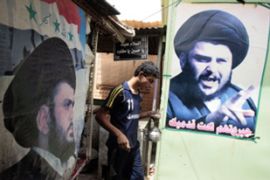Violence erupts in Sadr City
Several killed after clashes between Shia fighters and US troops despite truce.

Published On 13 May 2008
Splinter groups
It is not clear if those killed in the clashes were fighters or civilians.
US soldiers used tanks and aircraft to “suppress enemy fire” in four other clashes, the military said.
The military said that fighters had staged several attacks on US forces in Sadr City and elsewhere.
Lieutenant Colonel Steve Stover, a US military spokesman, said on Tuesday: “They are obviously not listening to any agreement.”
He accused so called “special groups” of launching attacks on US and Iraqi troops.
The US military says that most Shia fighters in Sadr City have splintered away from the Mahdi Army and al-Sadr’s influence on the groups is unclear.
He added that the “special groups” were responsible for a failed missile attack on a US helicopter gunship in Sadr City on Saturday, a day before the four-day ceasefire went into effect.
There has been sporadic fighting since Sunday.
Ceasefire talks
Talks between al-Sadr’s representatives and the United Iraqi Alliance that outlined the details of the truce did not finish until Monday.
The deal allows Iraqi forces to take over security in Sadr City from Wednesday.
The recent clashes first erupted in late March after Iraqi forces launched a crackdown in the southern city of Basra and shia fighters launched attacks targeting the heavily fortified Green Zone which houses the Iraqi government and Western embassies.
The ceasefire agreement states: “Any attack against residential areas, government offices and the Green Zone are prohibited from Sadr City or from another area.”
The Sadrists have rejected calls to surrender weapons but have agreed to allow government troops to carry out security sweeps, saying that Mahdi army fighters have no “medium or heavy weapons”.
Source: News Agencies